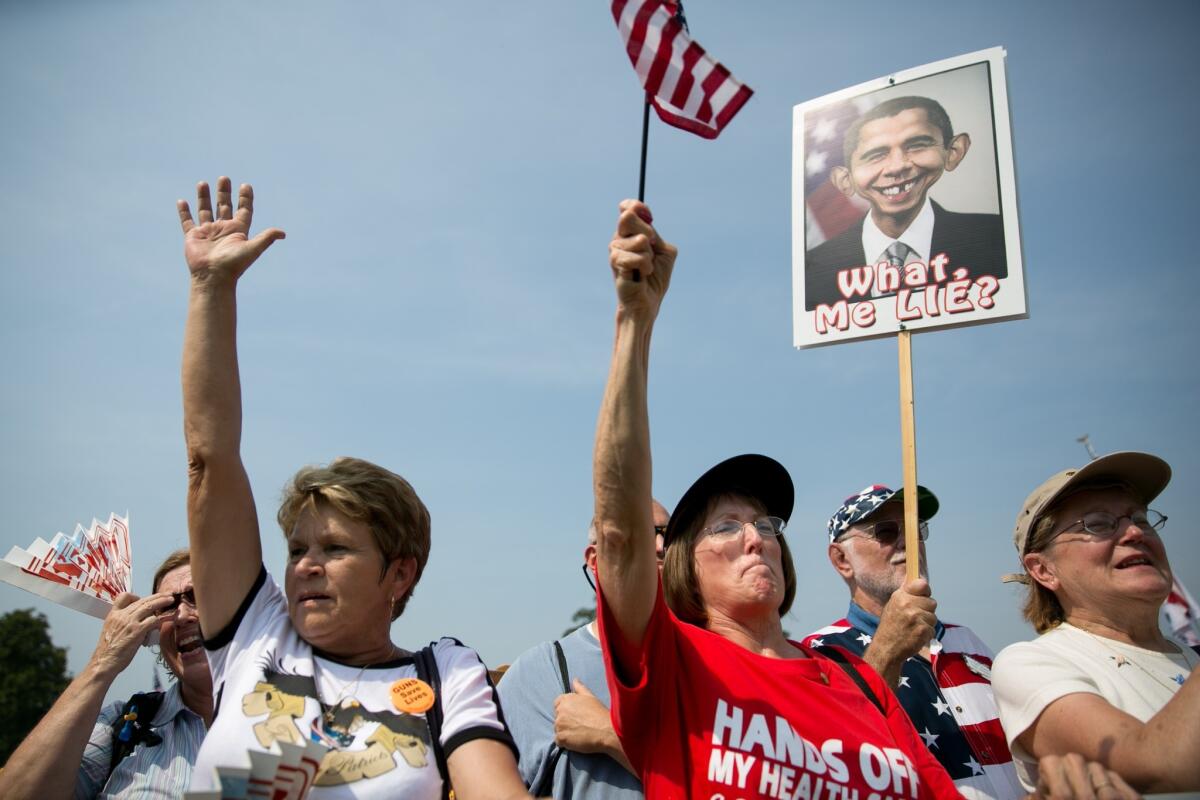Tea party and Obamacare: Fierce views driving House votes

- Share via
Republicans in Congress took their first vote Friday in a gamble that almost no one expects to end up going their way. The bet is that, to avoid a government shutdown, Democrats and President Obama would agree to gut funding for his signature domestic program, the nation’s healthcare law.
Even Republicans in the Senate have acknowledged that is not going to happen. But the measure passed anyway, largely because Obama’s plan has become, for a hugely influential piece of the Republican Party, about something far bigger than healthcare.
Two recent polls by the Pew Research organization, taken together, demonstrate what is behind Friday’s vote.
A poll released Sept. 16, and conducted jointly with USA Today, found middling disapproval nationally for Obamacare. But even those who disapproved of it narrowly wanted their elected officials to make it work rather than make it fail — by, say, stripping its funding in the way the House bill would.
But among Republicans and Republican-leaning Americans who ally themselves with the tea party movement, opposition to the healthcare program was nearly universal, with 94% opposing it. Most of them — 89% — said they disapproved very strongly, a figure of uncommon vehemence.
Of the tea party-aligned healthcare opponents, about two-thirds wanted elected officials to force it to fail. (The numbers were less emphatic among non-tea party Republicans; Democrats remained forcefully supportive of Obamacare.)
A poll released five days earlier showed some of the political repercussions of anything other than a scorched-earth approach to politics in the Capitol on issues like healthcare.
Among tea party sympathizers, the job approval rating of Republican leaders had fallen 15 points since it was measured in February, from 42% to 27%. Among non-tea party Republicans, there was no such drop in views about Republican leaders, and Democrats strongly approved of their own leaders.
The results illustrated that, even as the tea party-associated Republicans have become sort of outliers, they drive the party’s agenda because of their emphatic views on Obamacare and the idea of compromise.
“The healthcare law, to tea party Republicans, is just the emblem of everything that concerns them about Barack Obama,” said Michael Dimock, director of the Pew Research Center for the People and the Press. “The issue almost can’t be separated from Obama. To dislike the bill is to dislike Obama, and vice versa.”
And, it follows, to allow Obamacare to survive is tantamount to endorsing the president himself. Dimock noted that the lopsided numbers are rare in polling, except in instances like the war in Iraq, whose poll findings also broke in sharply partisan ways.
Politicians tend to ignore polls if they don’t agree with them; if not, Republicans in the House might have been voting for background checks for gun buyers rather than to de-fund Obamacare. (The voter corollary: Voters don’t care all that much about a politician who changes views, so long as the politician now agrees with them.)
But there can be real world consequences for Republicans who choose to ignore these recent polls, and members of Congress know it. In the last two election cycles, tea party-fueled candidates have knocked off more establishment GOP members in primaries, making them the first line of focus for those seeking re-election. In some one-party states, a primary challenge will be the fiercest competition a sitting lawmaker will have.
Healthcare has become a visceral issue in which a normally accepted disagreement over policy evolves into a dispute over rock-ribbed matters of character. That is why Republicans have voted dozens of times to kill it legislatively — the better to convince its opponents that they really mean it — and why their allies are spending great sums to turn public sentiment against it. It is now a clash about the direction of the nation itself.
Polls show that the individual pieces of the healthcare plan are broadly popular, particularly required coverage for those with pre-existing conditions, and coverage of young college graduates on their parents’ policies. It is when those elements come under the umbrella of “Obamacare” that views of the whole change.
“It’s not about them thinking that the law will be bad,” Dimock said of the opponents. “It will be disastrous. It’s so intertwined with broader political concerns.”
Twitter: @cathleendecker
More to Read
Sign up for Essential California
The most important California stories and recommendations in your inbox every morning.
You may occasionally receive promotional content from the Los Angeles Times.














